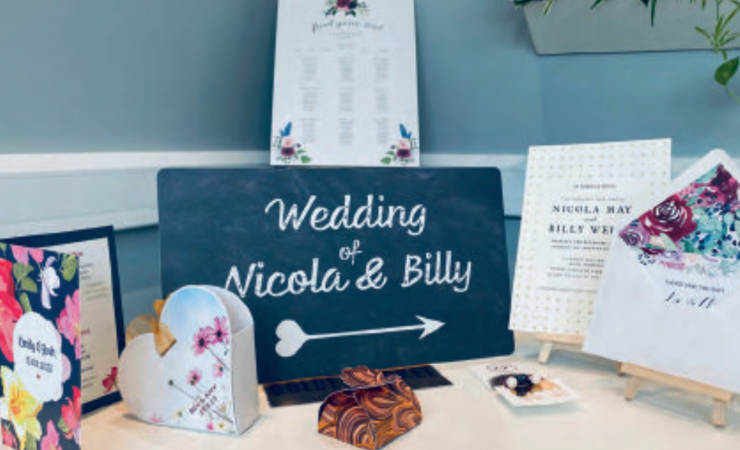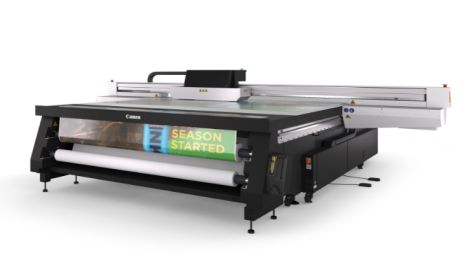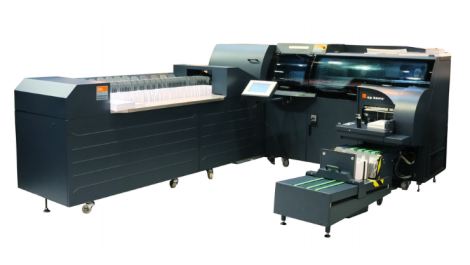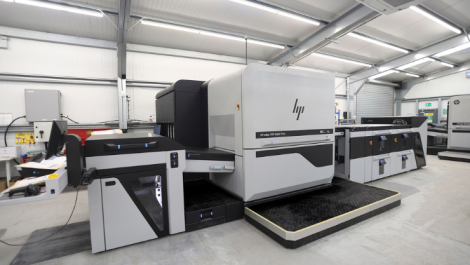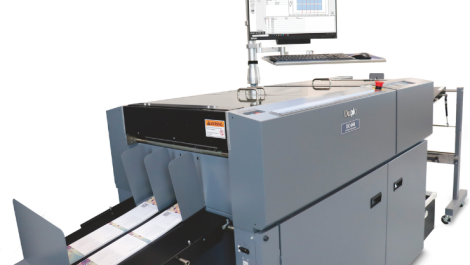Digital print is pretty well essential for producing one-off personalised products, which means that it’s a great market to explore if you’re already suitably equipped, and not a difficult one to tool up for if you’re not.
They say it’s the thought that counts when it comes to gifts, but it’s never been easier to turn the thought into physical reality when it comes to personalised products that demonstrate at least some degree of individual consideration. Examples range from coasters, mugs, mouse mats and notebooks to T-shirts, cushions, photo blocks, canvas prints, notebooks and of course the ubiquitous photo book.
From the big name consumer-facing e-commerce sites and eBay shops to smaller and more boutique operations selling via virtual outlets like Etsy or Not On The High Street, there are plenty of sources for consumers or businesses, but all of them need a fulfilment operation. While the big players own or run their own, that leaves a lot of space for the smaller businesses who don’t want to be printers but who do need to partner with one.
And then there’s the direct sales opportunity to work with existing clients, who may have come to you for other things but are open to buying more from a printer they know and trust. This is very much the situation at Fordingbridge Print, located near the picturesque New Forest, where relationships are everything.
The company was established a decade ago, as part of a conscious lifestyle decision by managing director Lorraine Whitburn and production director Andrew Wilson. The pair previously ran a major Agfa dealership, also selling Zünd equipment and print, which gave them useful experience on both sides of the industry, but decided to move out of the city in order to enjoy running a business of a ‘nice’ size.
‘The aim was to run a profitable but enjoyable business,’ explains Ms Whitburn.
This background explains the umbrella business Time2Display, under which Fordingbridge Print sits, alongside X-Consumables, a business consumables supply service and Paper Meadows, which provides wedding and celebration products as well of orders as service for funerals.
As events don’t get much more personal than weddings or funerals, it’s here that a lot of bespoke work is done.
Sales director Nicola Anten comments, ‘We do get pigeonholed, having won a lot of business on the bespoke side, on time-sensitive or labour-intensive work,’ but it’s clearly a successful formula, as the company doesn’t sell online and doesn’t even have a web portal for job submission.
‘We’re not Amazon,’ says Ms Whitburn, ‘We want people to pick up the phone.’ She goes on to add that 95% of deliveries are made by their own driver, who is the face of the company for many customers. It seems very much the antithesis of the automated ‘hands off’ approach often championed these days – ‘we proof everything back, and even correct spelling mistakes,’ says Ms Anten, adding that they will train customers on artwork production and advise on materials and options, encouraging customer visits to see and feel the materials, something particularly relevant for the Paper Meadows brand.
‘There’s nothing we can’t print, we have it all under one roof,’ adds Ms Anten, pointing out that customers typically can’t buy all the things they want online from one supplier anyway. Understanding the deadline-sensitive nature of event-related products, Fordingbridge staff will make calls at weekends if necessary, to ensure that everything arrives in the right place at the right time.
The ‘everything under one roof’ philosophy means that there’s quite a mix of equipment at the Hampshire site. For wide-format work, HP Latex printers are used, though Mr Wilson notes that the company waited for the second generation of these, before replacing its solvent machines.
A 1.6m HP Latex 365 has replaced an earlier 330 model. It’s used to print vinyl banners, papers and floor sticker materials and is complemented by a Seal 600 laminator.
Future plans may include a hybrid or flatbed machine to print directly to rigid media and textile printing via direct to-film technology is also under consideration. From the company’s origins in wide-format work, Mr Wilson says the mix between that and commercial is now around 50:50.
On the smaller format side, there’s a Ricoh Pro 7100 sheetfed toner press with the fifth colour option, mostly used to print white which Mr Wilson says works very well on textured materials and is popular in wedding products. He praises the registration of the press, along with the support, both reactive and proactive, from Ricoh. Complementing this is a Vivid Matrix 530 laminator which handles foil-overtoner work, again popular in wedding items, a Morgana Autocreaser and a Plockmatic booklet-maker, plus a Plockmatic collator feeding a Duplo perfect binder, though the latter is used for pad work rather than books.
The most recent addition is a Veloblade Volta 69+ digital cutter from Vivid, equipped with a tangential head, creaser and drag knives for through- or kiss-cuts. ‘We absolutely love it,’ says Mr Wilson, explaining how it’s been put to work on small cartons and tiny swing tags just 38mm square and needing 4mm holes, that were too small to be handled on the Ideal guillotine.
Personalised or branded items that the company can supply include mugs, pens, lanyards, caps, and T-shirts. A Ricoh desktop printer is used to print dye-sublimation or thermal transfer sheets as appropriate, for use in a dedicated mug press or by transfer via a FreeSub heat press, with further cutting as necessary on a Summa unit. A GCC Spirit laser cutter has also been added to produce more intricate paper products and engraving on wood, another product that has become popular in the weddings side of the business.
On the materials side, brands such as GF Smith and Fedrigoni feature prominently and suppliers ‘who see us as important’, such as Premier Paper, are regarded as valued partners, the latter being willing to bring in samples ‘at the drop of a hat’.
A more narrowly focused business is YoPhoto, an online photo products brand trademarked in 2007 by Tunbridge Wells, Kent-based Copytech, which was one of the first in the photobook sector. Managing director Nick Baldwin says that since then ‘a lot have jumped on the bandwagon but they are more marketeers than printers’, typically selling the product but not producing it themselves. While this does put pressure on his business, it also allows it to differentiate itself via its speed of turnaround. ‘If an order comes in before 12 noon, we can dispatch the same day,’ he says.
While the bulk of the work is photo books for consumers or photographers, YoPhoto also offers children’s books that enable the child’s name and pictures to be incorporated and which carry an ‘eco edge’ message. ‘We offer a zero plastic policy and use FSC-certified and recycled papers,’ notes Mr Baldwin. While he says that these features ‘make people feel good’ he’s not certain that they drive more business, though he notes growing demand for sustainably sourced materials on the corporate side.
The photo books and related items are printed on an SRA3 HP Indigo press chosen for its image quality. The photobook business was originally set up to fill spare capacity on the machine, though Mr Baldwin observes that some consumer customers have also become business ones as the Indigo quality is popular for professional portfolio work. The company plans to upgrade the Indigo in the not too distant future, to reduce operational costs, and is considering acquiring a second digital press as business levels return to pre-pandemic norms. This will probably be a dry toner model, for less quality-critical jobs but also able to handle long-sheet work for dust jackets and the like; items too large for the Indigo are currently produced on Canon ProGraf roll-fed printers.
The photobooks are created using Taopix software supplied by Transeo Media, which is integrated with the YoPhoto website by the company’s in-house developers. Mr Baldwin says the Cloud-based software is very flexible and likes how it integrates into the website behind the scenes.
YoPhoto has standardised on two papers for its photobooks, GenYous uncoated, which is favoured by photographers, and Symbol 3 silk, both supplied by Premier Paper. The Indigo press is profiled for both to achieve optimum results. The light magenta and cyan toners were tested but not felt to yield a sufficient quality improvement to warrant their extra cost, but the EPM (three colour) mode didn’t give the desired depth of blacks, so all work is done in standard CMYK.
On the finishing side, the company is geared up for case-bound books in-house and carries out a lot of hand finishing, which has in the past included foil blocking but Mr Baldwin notes that there has been a longer-term trend away from linen or other textured covers with foiling to more ‘printed’ ones.
While expecting to use silver ink on the company’s next Indigo machine, and interested in the possibilities of metallics on dry toner presses like the Xerox Iridesse or Ricoh Pro C7200, he feels that digital foiling alternatives ‘aren’t quite there yet’
